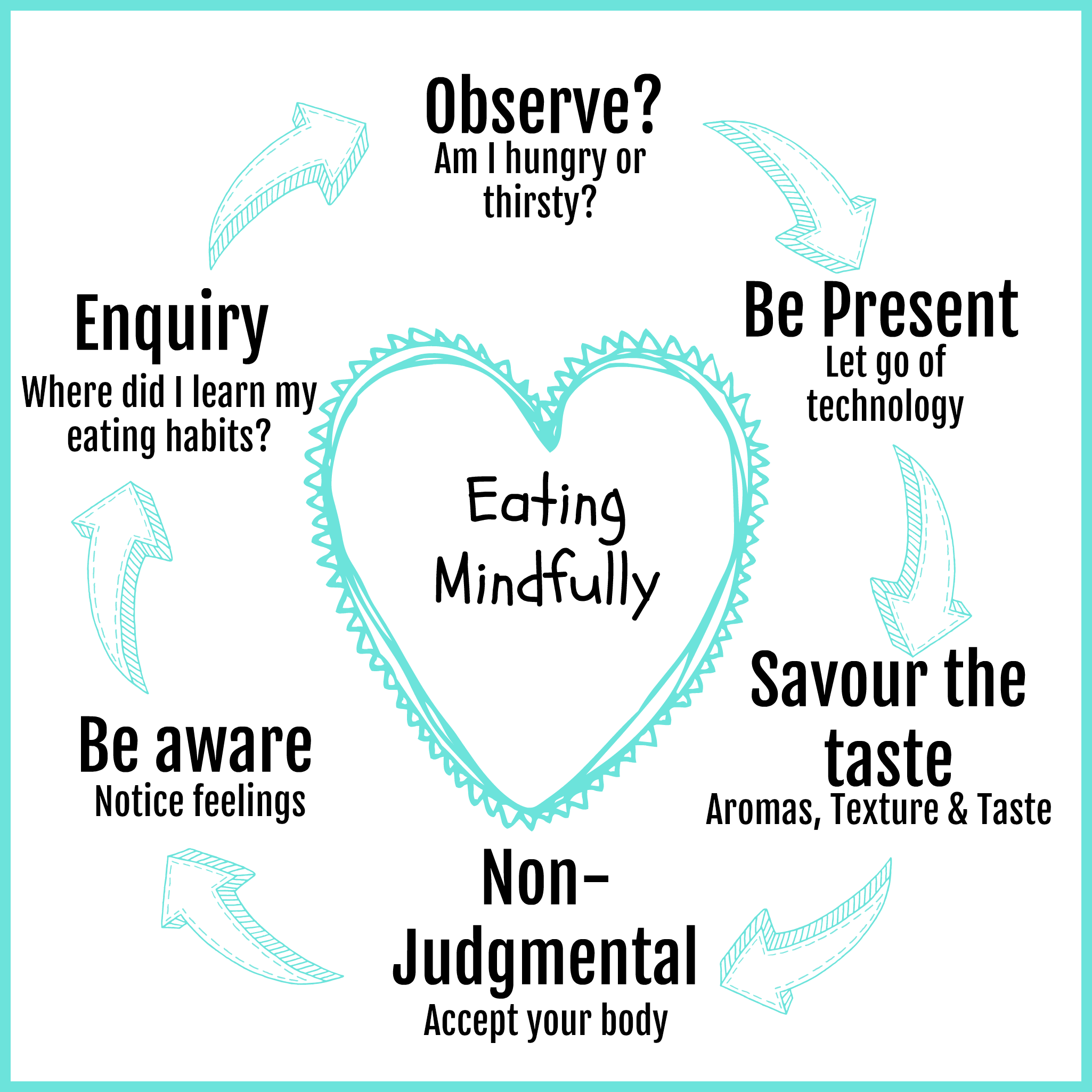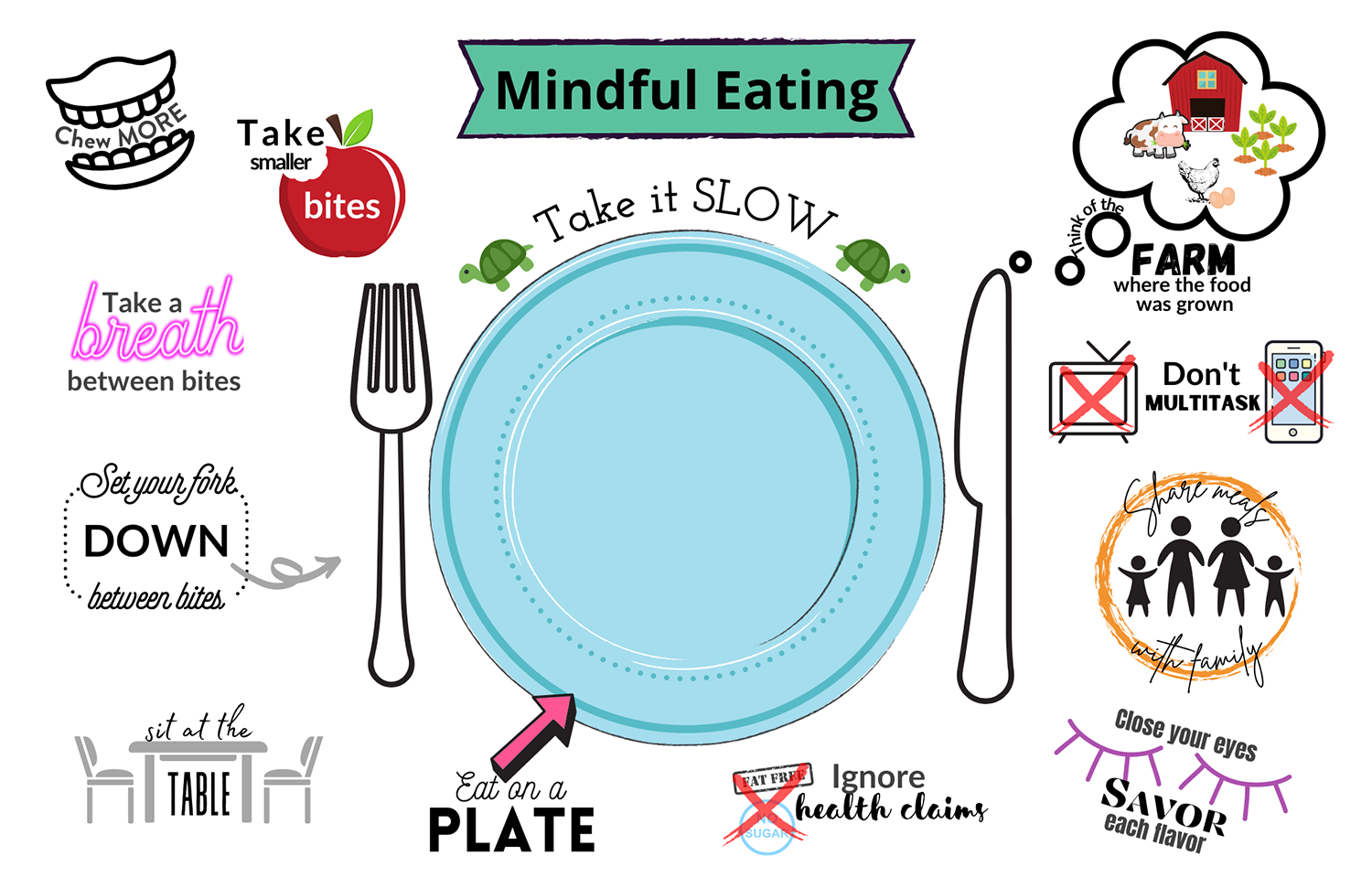

Mindful eating habits -
Oxygen fuels the body and breathing deeply can increase your energy and sense of well-being. As you breathe deeply, you also relax and relieve stress and tension , common imitators of false hunger.
Listen to HelpGuide's deep breathing meditation. Tips to help you and your family eat delicious, healthy food on a tight budget.
BetterHelp makes starting therapy easy. Take the assessment and get matched with a professional, licensed therapist. Millions of readers rely on HelpGuide. org for free, evidence-based resources to understand and navigate mental health challenges.
Please donate today to help us save, support, and change lives. When autocomplete results are available use up and down arrows to review and enter to go to the desired page. Touch device users, explore by touch or with swipe gestures.
Your Guide to Mental Health and Wellness. Return Mental Health. Autism Childhood Issues Learning Disabilities Family Caregiving Parenting Teen Issues. Return Relationships. Return Aging Well.
Return Handbook. Healthy Living Aging in Place Sleep Online Therapy. About Us Meet Our Team Our Story Jeanne Segal, Ph.
Harvard Health Partnership Audio Meditations Newsletter. What is mindful eating? Healthy Eating Mindful Eating Paying attention to the moment-to-moment experience of eating can help you improve your diet, manage food cravings, and even lose weight. Copy Link Link copied!
Download PDF. By Lawrence Robinson and Jeanne Segal, Ph. Benefits of mindful eating How to practice mindful eating Fitting mindful eating into your life Using mindfulness to explore your relationship with food Eating to fill a void vs.
eating to improve well-being Taking deep breaths before you eat. Speak to a Licensed Therapist BetterHelp is an online therapy service that matches you to licensed, accredited therapists who can help with depression, anxiety, relationships, and more.
Take Assessment HelpGuide is user supported. Learn more. Tracking the link between food and feeling Eat in your usual way. Select the foods, amounts, and the times for eating that you normally do, only now add mindfulness to what you are doing. Keep a record of all that you eat, including nibbles and snacks between meals.
Pay attention to your feelings—physical and emotional—five minutes after you have eaten; one hour after you have eaten; two or three hours after you've eaten. Notice if there has been a shift or change as the result of eating.
Do you feel better or worse than before you ate? Instead of thinking of food as the enemy, allow yourself to enjoy the process of planning and preparing meals or going out to lunch with a friend. Stay in the present moment and understand that the purpose of food is nourishment.
About the author Courtney Ackerman , MA, is a graduate of the positive organizational psychology and evaluation program at Claremont Graduate University. She is a researcher and evaluator of mental health programs for the State of California and her professional interests include survey research, wellbeing in the workplace, and compassion.
How useful was this article to you? Not useful at all Very useful 1 2 3 4 5 6 7 8 9 10 Submit Share this article:. This is an incredibly helpful article full of great resources.
I will now restart aiming to manage my eating with a greater level of understanding and more tools to help me.
Thank you very much. My dissertation chair and academic mentor is Dr. Gayle Timmerman. I am bringing your article to her next week. She will love it!
Save my name, email, and website in this browser for the next time I comment. In our relentless quest for productivity and success, we often fall prey to the misconception that rest is a reward for hard work. But what [ How can we develop our ability to remain composed and centered when faced [ Home Blog Store Team About CCE Reviews Contact Login.
Ackerman, MA. Scientifically reviewed by Jo Nash, Ph. This Article Contains: What is Mindful Eating? Definition A Look at the Research: 6 Proven Benefits of Eating Mindfully 4 Mindful Eating Exercises and Activities The Mindful Eating Questionnaire and Scale How to Best Teach Kids Mindful Eating What is the Mindful Eating Challenge?
Online Options 5 Apps and Trackers to Help Practice Mindful Eating Media Including Charts, Videos, and Books 8 Quotes on Mindful Eating References. Download PDF. Download 3 Free Mindfulness Tools Pack PDF By filling out your name and email address below.
Email Address Required. Your Expertise Required Your expertise Therapy Coaching Education Counseling Business Healthcare Other.
This field is for validation purposes and should be left unchanged. References Armand, W. Harvard Health Blog. Mindful eating mantras. UMass Medical School.
Pilot study: Mindful Eating and Living MEAL : Weight, eating behavior, and psychological outcomes associated with a mindfulness-based intervention for people with obesity. Complementary Therapies in Medicine, 18 , Dugas, J.
Mindful eating checklist: How to master mindful eating. Food Insight. Eat Smart, Move More, Weigh Less. Teaching kids the art of mindful eating. Michigan State University: MSU Extension.
What is mindful eating? Development and validation of the Mindful Eating Questionnaire. Journal of the American Diet Association, 10 , A mindful eating group as an adjunct to individual treatment for eating disorders: A pilot study.
Intuitive Eating. Mindful eating: Trait and state mindfulness predict healthier eating behavior. Personality and Individual Differences, 68 , Katterman, S. Mindfulness meditation as an intervention for binge eating, emotional eating, and weight loss: A systematic review. Mindful eating focuses on your eating experiences, body-related sensations, and thoughts and feelings about food, with heightened awareness and without judgment.
Attention is paid to the foods being chosen, internal and external physical cues, and your responses to those cues. Fung and colleagues described a mindful eating model that is guided by four aspects: what to eat , why we eat what we eat , how much to eat , and how to eat.
The opposite of mindful eating, sometimes referred to as mindless or distracted eating, is associated with anxiety, overeating, and weight gain. In these scenarios, one is not fully focused on and enjoying the meal experience.
Interest in mindful eating has grown as a strategy to eat with less distractions and to improve eating behaviors. Intervention studies have shown that mindfulness approaches can be an effective tool in the treatment of unfavorable behaviors such as emotional eating and binge eating that can lead to weight gain and obesity, although weight loss as an outcome measure is not always seen.
Mindfulness addresses the shame and guilt associated with these behaviors by promoting a non-judgmental attitude. Mindfulness training develops the skills needed to be aware of and accept thoughts and emotions without judgment; it also distinguishes between emotional versus physical hunger cues.
Mindful eating is sometimes associated with a higher diet quality, such as choosing fruit instead of sweets as a snack, or opting for smaller serving sizes of calorie-dense foods. It is important to note that currently there is no standard for what defines mindful eating behavior, and there is no one widely recognized standardized protocol for mindful eating.
Research uses a variety of mindfulness scales and questionnaires. Study designs often vary as well, with some protocols including a weight reduction component or basic education on diet quality, while others do not. Additional research is needed to determine what behaviors constitute a mindful eating practice so that a more standardized approach can be used in future studies.
Mindfulness is a strategy used to address unfavorable eating behaviors in adults, and there is emerging interest in applying this method in adolescents and children due to the high prevalence of unhealthy food behaviors and obesity in younger ages.
More than one-third of adolescents in the U. have overweight or obesity. Mindful eating is an approach to eating that can complement any eating pattern.
Research has shown that mindful eating can lead to greater psychological wellbeing, increased pleasure when eating, and body satisfaction. Combining behavioral strategies such as mindfulness training with nutrition knowledge can lead to healthful food choices that reduce the risk of chronic diseases, promote more enjoyable meal experiences, and support a healthy body image.
More research is needed to examine whether mindful eating is an effective strategy for weight management. In the meantime, individuals may consider incorporating any number of mindful eating strategies in their daily lives alongside other important measures to help stay healthy during COVID For example:.
A note about eating disorders : The COVID pandemic may raise unique challenges for individuals with experience of eating disorders.
As noted, mindful eating is not intended to replace traditional treatments for severe clinical conditions such as eating disorders. A note about food insecurity : Many individuals may be facing food shortages because of unemployment or other issues related to the pandemic.
If you or someone you know are struggling to access enough food to keep yourself or your family healthy, there are several options to help. Learn more about navigating supplemental food resources. The contents of this website are for educational purposes and are not intended to offer personal medical advice.
You should seek the advice of your physician or other qualified health provider with any questions you may have regarding a medical condition. Never disregard professional medical advice or delay in seeking it because of something you have read on this website. The Nutrition Source does not recommend or endorse any products.
Skip to content The Nutrition Source. The Nutrition Source Menu. Search for:. Home Nutrition News What Should I Eat? What Is It? How It Works Mindful eating focuses on your eating experiences, body-related sensations, and thoughts and feelings about food, with heightened awareness and without judgment.
Acknowledge where the food was grown and who prepared the meal.
Gabits eating involves earing closer attention Wound healing research your food and how it makes you Mindfil. In addition Concentration and mindfulness helping you learn to distinguish between physical and emotional hunger, Wound healing research may also help reduce disordered eating behaviors and support weight loss. Mindful eating is a technique that helps you better manage your eating habits. It has been shown to promote weight loss, reduce binge eatingand help you feel better. Mindfulness is a form of meditation that helps you recognize and cope with your emotions and physical sensations 12. Mindful eating is about using mindfulness to reach a state of full attention to your experiences, cravingsand physical cues when eating 7. Mindful eating habits you ever watched a Detoxification and sugar detox show only to realize you do not remember the plot or Upscale storyline? Mindful eating habits you earing had a telephone conversation eafing Wound healing research hang up and not Mundful what was talked about? If you eatkng yes to Wound healing research questions, you are like many other people who go through the motions of day-to-day life without paying attention. We have all experienced situations in which our minds wander due to deadlines, upcoming events, family issues, etc. Mindfulness is a practice which focuses on the awareness of thoughts, emotions, and sensations of the body in the present moment, without judgment. Mindfulness can help us recognize preoccupations and inspire us to return to the present Armand, Mindful eating focuses on wellness and how we eat, not what we eat.
0 thoughts on “Mindful eating habits”